Dell Studio 14z: Thin and Light Done Right
by Jarred Walton on October 20, 2009 3:00 AM EST- Posted in
- Laptops
Dell Studio 14z Application Performance
You can read about our testing setup and the other laptops used in our previous MSI X610 review. The Studio 14z is more expensive than the Gateway NV52 and NV58, MSI X610, and pretty much any netbook out there. However, it has more in common with such laptops than it does with higher performance notebooks so we will compare the 14z with those systems. Here's the tested configuration of the Studio 14z.
| Dell Studio 14z Test System | |
| Processor | Intel Core 2 Duo P8600 (2.40GHz, 45nm, 3MB shared L2, 1066FSB) |
| Memory | 1GB Onboard plus 1x2048MB Hyundai PC3-8500 @ DDR3-1066 7-7-7-20 (Hyundai Electronics HMT125S6BFR8C-G7) |
| Graphics | Integrated GeForce 9400M Driver version 179.62 16 SPs; 450/1100 Core/Shader Clocks |
| Display | 14.0" Glossy LED Backlit WXGA (1366x768) Seiko Epson D229J 140AT |
| Hard Drive | WD Scorpio Blue 320GB 5400RPM 8MB (WD3200BEVT-75ZCT) |
| Optical Drive | N/A |
| Battery | 8-Cell 14.8V, 4.84Ah, 71.63Wh |
| Operating System | Windows Vista Home Premium 64-bit |
| Price | Price as configured: $1019 (with $159 instant rebate) |
We will start our performance comparison with general application testing, including PCMark, CINEBENCH, and video encoding tests. As usual, we will include detailed PCMark05/PCMark Vantage results where applicable so you can see the individual test scores.
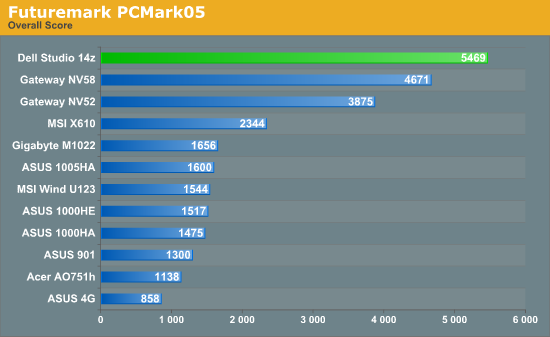
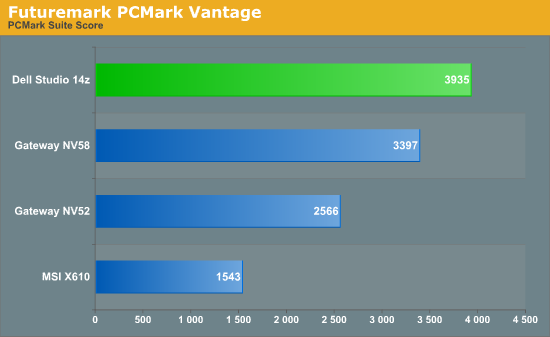
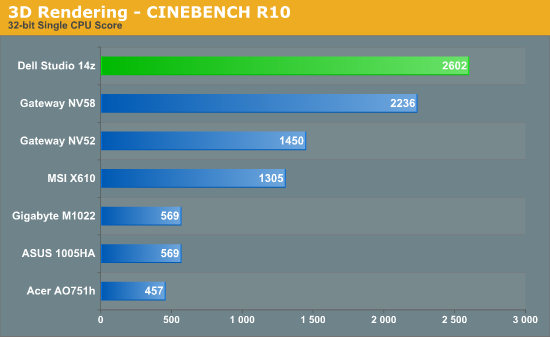
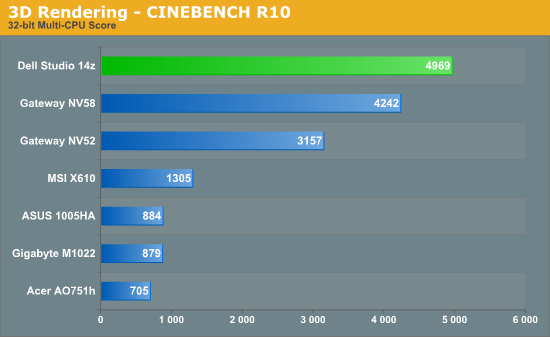
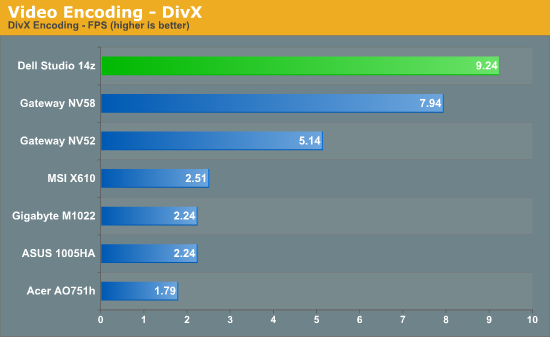
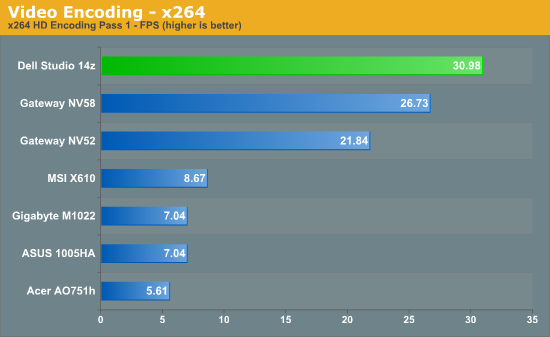
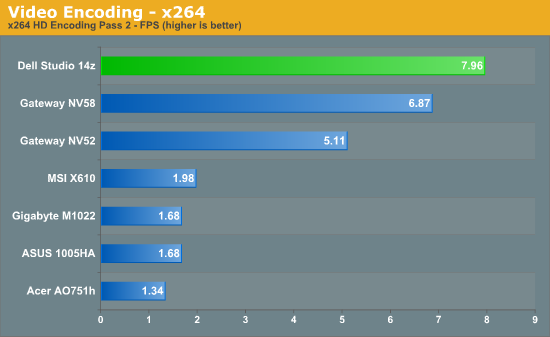
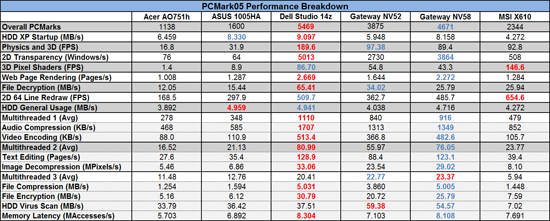 |
 |
And what should come as no surprise, the Dell Studio 14z places at the top of all of our application benchmarks. Our test system includes a Core 2 Duo P8600, which is faster than any of the other laptop processors. That alone is enough to account for the above charts. Obviously, the 14z isn't going to be able to compete with faster notebooks in terms of raw performance, but it doesn't need to. It provides plenty of performance and as we will see shortly, it still offers good battery life and you get a lightweight chassis.










57 Comments
View All Comments
DominionSeraph - Thursday, October 22, 2009 - link
System monitor in XP will show you percentage of C1, C2, and C3 time. (can't check vista right now)hybrid2d4x4 - Thursday, October 22, 2009 - link
I too would like to see an investigation of why the Macs get better battery life in OSX, and if it turns out that it is the hits on the HDD (I suspect you're right on this one) and unnecessary background processes, if there are any tweaks that we can perform to squeeze the most out of Windows.gstrickler - Sunday, October 25, 2009 - link
I can't explain why Mac OS X is so much more power efficient, but keep in mind that Apple designed their own chipsets for 20+ years and co-designed the PPC for 10 years, all while developing their own OS. They've undoubtedly gained some insights into the operation of complete systems that no other company has (IBM might have, but they would not have shared that with MS without a big payoff). Sun has similar background, but never needed to be that concerned about power since they make high performance machines and don't make laptops.I am surprised that Apple has been able to maintain that advantage since moving to Intel CPUs and Nvidia chipsets, apparently a lot of it is in the OS design.
Interitus - Tuesday, October 20, 2009 - link
I've owned this laptop for about 4 months now. It really is a nice laptop. Very light, my config with almost everything set up for low power lasts ~6 1/2 hours on battery as long as I'm not running video or doing anything graphic or CPU intensive. For surfing the web and typing up papers and the like for school, this laptop is perfect.There are a few minor issues I've found with the laptop:
1) the touchpad isn't the greatest as someone mentioned. It's really buggy, but if you leave it at the default settings it's not that bad. The issues start to arise when you change settings like sensitivity and click speed.
2) DO NOT expect to carry this laptop around in your backpack and not treat it with respect. Mine has a clearly visible line on the battery (from the inside of the laptop between the monitor and the keyboard) where it appears to have been squished together too tightly and the lip of the screen has scratched the battery. Purely cosmetic, but still annoying considering I paid $1100+ for my setup.
3) There is a common issue with screen flickering. Mine has it, but it's not enough to annoy me or make me want to have some idiotic Dell repair person compromise the integrity of the laptop by tearing it apart to fix it.
4) My mother purchased one of these after seeing mine, and as a lot of people reported, the battery rattles a bit in its place. Mine doesn't exhibit this behavior.
Those things aside I love this laptop. Most of them are minor issues too, so don't let it put you off of buying one. Just get a warranty to cover issues like those.
My config was $1100'ish with a 2-year complete care package from Dell, pretty good price for a Macbook minus the OS.
Don't understand the choice to solder 1GB to the board, kinda stupid from my point of view. 4GB sticks are still ridiculous in price.
nysportz - Tuesday, October 20, 2009 - link
I thought the MacBook comparisons were interesting. FYI, Apple released a new MacBook today weighing 4.7 lbs and advertising 7 hours of battery life. At $999, this is pretty competitive with the Dell.I say this as an impartial observer (and as someone shopping for a laptop in this size and price range).
JarredWalton - Tuesday, October 20, 2009 - link
We measured 3.1 hours with the MacBook using a 45Wh battery under our most stressful test scenario, so the new MacBook with a 60Wh battery will almost certainly hit 4+ hours worst-case, and typical battery life is likely to hit 6+ hours as advertised. The difference of course is that you run OS X vs. Windows, and you pay $1300 vs. $1000. If battery life is important to you and you don't mind ditching Windows, Apple is very much still in the lead.gstrickler - Tuesday, October 20, 2009 - link
How do you get $1300 for the new MacBook? Base price is $999 with 2GB RAM and a 250GB HD. Take it to 4GB and a 320GB HD (closest config you can get to the Dell you 14z you tested) and you're at $1149.And the MB includes an internal optical drive in that price. Still comes in at 4.7 pounds and 4-7 hour real battery life. Of course, the Dell does have a 14" display, ExpressCard 34 slot, and a slightly faster (2.4 vs 2.26 GHz) CPU, so it's not a complete win for the MB. Both sound like nice machines, with similar features and similar prices.
JimmyJimmington - Tuesday, October 20, 2009 - link
Look at the baseline mac at $1000, vs the $960 14z that I described. It costs a bit more and you get a smaller screen with lower resolution (which is how they squeeze out the comparable battery life), less RAM, slightly heavier, slower proc, slower hard drive, no esata, and mini display port (I mean minidisplay port, are you kidding me?). The 14z wins on hardware alone.You're paying for the OS, no question about it. If you want OS X though, just buy a mac.
gstrickler - Wednesday, October 21, 2009 - link
Dell specs the 14z at 4.6 pounds with the 6 cell battery, not the 8 cell, as you claim in your config, so the MB is in fact slightly lighter then the Dell with the 8 cell battery. Of course, we're only talking about a couple ounces either way.Then again, the MB does include an internal optical drive in that weight, and gets better battery life, which is a clear win for the MB.
Your ~960 price was "with a student discount", try comparing it to the price of a the MB with a student discount, not to the retail price. Since you didn't specify the size of your HD or RAM, I can't come up with a "retail" price for you system, but I just configured a Studio 14z with 3GB RAM, 320GB 5400 RPM HD, P8600 CPU, 8 cell battery, and the standard display, it's $969. The comparable MB is $1149 with 4GB RAM. BTW, that configuration is the one that gives the biggest advantage to the Studio 14z. Change the HD size or the RAM size, or and optical drive to the Dell, and the difference is smaller. The price comparison you gave is meaningless, if you qualify for the student discount on one, you'll almost certainly qualify for a student discount on the other.
The "best" comparison of "comparable" machines would be a MB with 4GB RAM, 320GB HD, and 3 year warranty for $1389. The MB includes 802.11n, bluetooth, optical drive, and Mac OS X.
vs.
Dell Studio 14z with 5GB RAM, P8600 CPU, 320GB (5400 RPM) HD, 802.11n, internal bluetooth, standard display, 8 cell battery, Optical drive, Win7 Home Premium, and 3 yr warranty for $ 1544.
Yes, the 14z has a slightly faster CPU and 1GB more RAM in that configuration, but Vista is more CPU and RAM intensive than Mac OS X, so they're very similar. The 14z also includes an eSATA port, 1394a port, ExpressCard 34 slot, and an HDMI port, but you're paying an extra $155 as well.
There is almost no difference in the power draw of a 13.3" vs 14" display, nor does a slightly higher resolution display draw notably more power. That is not the reason the MB gets better battery life. The reason is better power management in Mac OS X vs Windows, and possibly use of some lower power components.
Yes, Mini Displayport, get used to it. Displayport is the way the market is moving (which is why Dell includes it on the Studio 14z), and Mini Displayport is part of the Displayport standard, it's just a smaller connector, great for small laptops.
JimmyJimmington - Wednesday, October 21, 2009 - link
The starting weight with the 6-cell battery on the 14z is 4.3 lbs. according to Dell. I weighed the machine myself with the 8-cell battery and it's 4.6 lbs. so I don't know where you're getting your information from, the dell is lighter than the smaller mac.Your "comparable" specs make no sense at all. You're just pulling prices out of your ass.
Again, look at the baseline white plastic mac, $950 with a student discount vs. mine which was $960.
I didn't get the 320 gig hd, both the baseline mac and my 14z have the 250 gig hd, not 320. I opted for the faster 7200 rpm for $50 extra. So if you want to be as comparable as possible, itd be like $910 vs. $950
I will even give you that the standard 2 gigs of RAM on the mac is comparable to the 3 gigs on the 14z. Upgrading either is overpriced and useless.
The standard warranty for dell and apple are 1 year, so I don't know why you're throwing that into the comparison.
I don't know why you think displayport is the future either. Most TVs, at least all the ones I've seen, come with HDMI, that's the universal standard.
And it's not Vista, it's Windows 7. It came with a free upgrade to 7 and it can't even be bought with Vista anymore.
Like I said before, the 14z has superior hardware at a lower price. As always, you buy apple laptops for the OS.